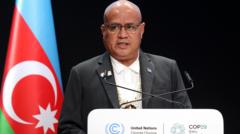In a significant development for Tuvalu, the tiny island nation has inaugurated its first cash machines, marking a pivotal shift towards electronic banking for its 11,000 residents. The event was described by Prime Minister Feleti Teo as a momentous occasion and a transition into a new era of financial services.
Tuvalu Introduces First Cash Machines in Landmark Economic Shift

Tuvalu Introduces First Cash Machines in Landmark Economic Shift
The Pacific island nation of Tuvalu makes history with its first cash machines, enhancing electronic banking access for its citizens.
The introduction of five cash machines and 30 point-of-sale terminals on Funafuti, Tuvalu's main island, signals improvements in access to banking services for local inhabitants, who previously relied on physically visiting banks for cash withdrawals. The machines were unveiled in a ceremony at the National Bank of Tuvalu's headquarters in Vaiaku, attended by government officials, traditional leaders, and business representatives.
Prime Minister Teo expressed the importance of this development, stating, "We've been in an analogue space all along, these were dreams for us." He acknowledged the investment required for the introduction of these machines but highlighted the government's commitment and determination to enhance banking accessibility.
Although the initial launch means that cash machines can only accept prepaid cards, plans are in motion to roll out debit and credit card services for international use in the future. This transition to electronic payments is expected to empower local businesses and facilitate financial transactions, moving away from the time-consuming process of cash withdrawals, especially noticeable during payroll periods when long queues form outside banks.
Siose Penitala Teo, head of the National Bank of Tuvalu, emphasized that this shift promotes economic empowerment for the nation, underscoring the significance of this advancement in a place where financial accessibility has been historically limited.
Tuvalu, an archipelago of nine low-lying islands, gained independence from the UK in 1978 and faces pressing climate change challenges, including the risk of rising sea levels. Prime Minister Teo's recent statements at COP29 highlighted these dangers, stressing that Tuvalu could eventually be submerged due to climate-related issues. The new banking service may provide crucial financial tools as residents grapple with uncertainties posed by their geographical vulnerabilities.
Prime Minister Teo expressed the importance of this development, stating, "We've been in an analogue space all along, these were dreams for us." He acknowledged the investment required for the introduction of these machines but highlighted the government's commitment and determination to enhance banking accessibility.
Although the initial launch means that cash machines can only accept prepaid cards, plans are in motion to roll out debit and credit card services for international use in the future. This transition to electronic payments is expected to empower local businesses and facilitate financial transactions, moving away from the time-consuming process of cash withdrawals, especially noticeable during payroll periods when long queues form outside banks.
Siose Penitala Teo, head of the National Bank of Tuvalu, emphasized that this shift promotes economic empowerment for the nation, underscoring the significance of this advancement in a place where financial accessibility has been historically limited.
Tuvalu, an archipelago of nine low-lying islands, gained independence from the UK in 1978 and faces pressing climate change challenges, including the risk of rising sea levels. Prime Minister Teo's recent statements at COP29 highlighted these dangers, stressing that Tuvalu could eventually be submerged due to climate-related issues. The new banking service may provide crucial financial tools as residents grapple with uncertainties posed by their geographical vulnerabilities.




















